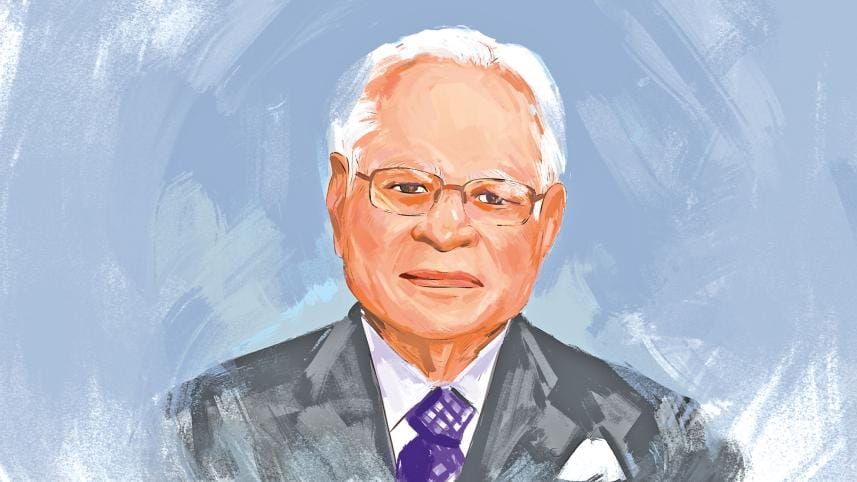Samson H Chowdhury an entrepreneur who built his empire on ethics and values

Business must serve people: this was the principle Samson H Chowdhury lived by. He saw no conflict between business and ethics, only the possibility of using both as a force for good.
From scratch, he built Square Group into a conglomerate spanning pharmaceuticals, textiles, consumer products and healthcare, yet never strayed from his core belief.
That conviction guided his family, too. It pleased him when his son chose to build a hospital rather than a luxury shopping complex, and it inspired him to carry on with an expensive cancer hospital project, even paying personally for medical equipment.
"Do not just chase profit. Do not measure everything by numbers," Chowdhury would tell his son.
Samson H Chowdhury, who died in 2012, would have turned 100 this year. Even after his demise, his spirit of service endures. On his birth centenary, his philosophy is evident across the business empire the tycoon founded.
To mark the occasion, his children are launching mobile clinics to provide primary healthcare in remote areas. Staffed by doctors and equipped for basic diagnostics, the clinics will also distribute free medicines.
The family also plans to set up a medical college and hospital, a nursing college, an old home and a school for children at Amin Bazar on the outskirts of Dhaka under a trust.
Their vision is a community where elderly people and children can interact, learn and enrich each other's lives. The hospital will offer quality healthcare at an affordable cost. And the construction of the project is set to begin this year.
Chowdhury was born on September 25, 1925, in Pabna. Son of a small-town medical practitioner, he saw early how essential healthcare was to ordinary people and how limited access could turn curable illnesses into tragedies.
That childhood shaped his sense of business and social responsibility.
After finishing his education, he briefly worked as a medical representative in Kolkata. In 1958, he returned to Pabna and, with three friends, opened a small pharmacy in Ataikula. They called it Square, symbolising perfection and fairness -- ideals he wanted in life and work.
At that time, few thought a local firm could compete in pharmaceuticals, a market then dominated by foreign multinationals.
But Chowdhury was determined to prove otherwise. With time, he built Square Group into one of the country's largest conglomerates, embedding honesty, discipline and fairness into its corporate DNA.
A powerful example of his approach came in 2010 when Square planned the Square Cancer Centre.
The project was moving slowly due to concerns about its heavy investment and long payback period. At one stage, he issued a cheque from his personal account to buy medical equipment for cancer patients.
He called his son Tapan Chowdhury, now managing director of Square Hospitals Ltd, and said, "Do not just chase profit. Do not measure everything by numbers."
"You have come this far not only because of your hard work but also because of the people of this country, the doctors who trusted your products and the patients who had faith in you. This hospital is for them. Do not worry about the money, think about the benefit to people."
Originally, Square had planned a luxury hotel or shopping mall in Panthapath area in Dhaka, and even signed an agreement with the Central Group of Thailand. But after Tapan lost his son in a road accident, he chose to build a hospital instead.
"My father was so happy when he heard this," Tapan recalls.
The father summed up his philosophy simply: honesty sustains success. "Even if it takes longer, success built on ethics and quality will last," he often said.
In the 1990s, when the value-added tax (VAT) was introduced, many competitors evaded it to cut costs. But Chowdhury refused.
"VAT is paid by consumers. It does not belong to us. Companies that steal tax money will not survive," he declared. Time proved him right; those firms disappeared.
He also stayed grounded in governance.
When his son became an adviser to the caretaker government in 2007, Chowdhury still went to the Secretariat for business matters and sat in front of a deputy secretary for official tasks.
When urged to avoid it, he replied, "A farmer cannot expect a good harvest if he does not go to his farmland."
Under his leadership, Square avoided the trap of being a family-dominated enterprise. Instead, it encouraged a corporate culture where employees and directors worked as a trusted family, helping the group thrive across three generations.
Chowdhury believed in walking the straight path of honesty, accountability and respect for people. His life showed that business can be both profitable and principled.
A century after his birth, his message is now more relevant than ever. In a global business environment often scarred by scandals and short-termism, his story proves that ethics are not a barrier to success but the foundation of it.




 For all latest news, follow The Daily Star's Google News channel.
For all latest news, follow The Daily Star's Google News channel.
Comments